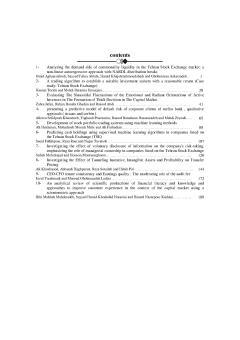Investigating the effect of voluntary disclosure of information on the company's risk-taking, emphasizing the role of managerial ownership in companies listed on the Tehran Stock Exchange.
Subject Areas : Stock ExchangeHossein Motazerghaem 1 , safieh mehrinejad 2 *
1 - Master's student, Department of Financial Management, Central Tehran Branch, Islamic Azad University, Tehran, Iran
2 - Associate Professor, Department of Financial Management, Central Tehran Branch, Islamic Azad University, Tehran, Iran
Keywords: Managerial Ownership, voluntary disclosure of information, company risk taking,
Abstract :
The main purpose of the current research is to investigate the effect of voluntary disclosure of information on the company's risk-taking, emphasizing the role of managerial ownership in companies listed on the Tehran Stock Exchange during the years 2011 to 2019. The statistical sample of the research is 159 companies. The research method is descriptive-correlation with applied approach. The method of collecting information in the theoretical foundations section was the library method, and in the hypothesis testing section, the document analysis method of financial statements was used. In general, the hypothesis testing method is correlation and multiple regression. The results of the research showed that the voluntary disclosure of information has a direct and significant effect on the company's risk-taking, and increasing the percentage of managerial ownership strengthens this effect. The results related to the control variables showed that the financial leverage and the ratio of accruals have an inverse and significant effect on the company's risk-taking, and the effect of the company's size and operating cash flow on the company's risk-taking; it is direct and meaningful
_|1) احمدوند، مسعود. اقبالی، حسین. (1399). شناسایی و رتبهبندی انواع ریسک در پروژههای نمونه کاربردی: خط 7 مترو تهران زیرزمینی به روش AHP. مهندسی سیستم و بهرهوری. 1 (1). 7-29.
2) برزگر، س. خاتمی، ز. (1398). بررسی تأثیر مالکیت مدیریتی بر ریسک سقوط آتی قیمت سهام در شرکتها، پژوهش در حسابداری و علوم اقتصادی، سال سوم، شماره 5 (جلد اول)، صص. 51 تا 62.
3) بیات، علی. آب چهر، بهجت.، (1397)، ارتباط بین الگوهای تصمیمگیری و انتظارات سرمایهگذاران از ریسک و بازده سرمایهگذاری در ابزارهای مالی بر اساس مدل مارکویتز، فصلنامـه علمی پژوهشی دانش سرمایهگذاری ، سال چهارم، شماره شانزدهم، 802-857 .
4) پورحیدری، علي؛ و حسين افلاطونی (1392). انگیزههای هموارسازی سود در شرکتهای پذیرفتهشده در بورس اوراق بهادار تهران. بررسیهای حسابداری و حسابرسي، شماره 52، ص 3 تا 17.
5) جوادیان لنگرودی، مریم (1398) بررسی تأثیر کیفیت گزارشگری مالی بر ریسکپذیری در بورس اوراق بهادار تهران، پایاننامه کارشناسی ارشد دانشکده ادبیات و علوم انسانی، دانشگاه گیلان.
6) شاکر، ع. (1396). بررسی تأثیر ساختار مالکیت بر ریسک نقدینگی سهام شرکتهای پذیرفتهشده در بورس اوراق بهادار تهران، اولین کنفرانس ملی کاربرد پژوهشهای نوین در علوم انسانی، قائمشهر.
7) صادقی یخدانی، غ. خانی، ع. بیت شکن، م. (1399). بررسی تأثیر افشای اطلاعات بر صرف ریسک سهام با توجه به سطح نرخ رشد شرکت، بررسیهای حسابداری و حسابرسی، دوره 27، شماره 3. صص. 381-409.
8) طولابی، س. امجدیان، ی. (1399). تأثیر مالکیت مدیریتی بر ریسک سقوط آتی قیمت سهام، رویکردهای پژوهشی نوین در مدیریت و حسابداری، شماره 38 (جلد هشتم)، صص. 55-68.
9) عزلتی، ف. نوری فرد، ی. امام وردی، ق. دارابی، ر. حاجیها، ز. (1400). افشای داوطلبانه اطلاعات غیرمالی و آثار آنها (با تأکید بر انطباق تئوریهای علامتدهی و مشروعیت). دانش حسابداری و حسابرسی مدیریت. 10 (38). 67-86.
10) فشاری، م. (1396). بررسی تأثیر ساختار مالکیت بر رفتار ریسکپذیری بانکهای خصوصی و دولتی ایران (رهیافت دادههای تابلویی پویا). فصلنامه پژوهشهای پولی-بانکی، سال دهم ، شماره ۳۲ ، صص. 199-225.
11) كردستاني، غلامرضا (1391). بررسي رابطه بين ثبات مدیریت و هزينه سرمايه سهام عادي، بررسیهای حسابداري و حسابرسي، شماره 48، ص 85 تا 104.
12) کارگرشورکی، م. نظامی، ا. (1393). تأثیر ساختار مالکیت بر ریسک در شرکتهای پذیرفتهشده در بورس تهران، دومین کنفرانس بینالمللی مدیریت چالشها و راهکارها، شیراز.
13) Albringa Susan M., Xiaolu Xub. (2020). Management earnings forecasts, managerial incentives, and risk-taking. Advances in Accounting. 145 (3), 335–361
14) Botosan, C. A. (2017). Disclosure Level and the Cost of Equity Capital. The Accounting Review, 72, 323-349.
15) Chen, J.Z., L. Rees, K. Sivaramakrishna, (2016). Are all benchmark beaters treated the same? Accrual-based versus real earnings management. Working paper (University of Colorado at Boulder).
16) Hung, M., Jing, S. and Wang, Y. (2017). The Effect of Mandatory CSR Disclosure on Information Asymmetry: Evidence from a Quasi-natural Experiment in China. http://www.ssrn.com. incentives, and risk-taking. Advances in Accounting. 145 (3), 335–361
17) Lem, X. and Leman, H. I. (2020). Mandatory financial reporting and voluntary disclosure: The effect of mandatory IFRS adoption on management forecasts. The Accounting Review, 91(3), 933–953.
18) Louis, H., Robinson, D., 2021. Do managers credibly use accruals to signal private information? Evidence from the pricing of discretionary accruals around stock splits. J. Account. Econ. 39, 361–380.
19) Tang, X., Du, J., Hou, Q., 2018. The effectiveness of the mandatory disclosure of independent directors’ opinions: empirical evidence from China. J. Account. Econ. 32, 89–125.
20) Wardhani, R. (2019). The role of audit quality on market consequences of voluntary disclosure: Evidence from East Asia. Asian Review of Accounting, 27(3), 373-400.
|_

